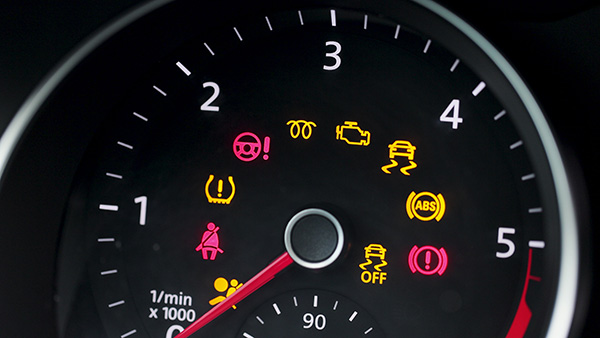
In today's vehicles, dashboard warning lights serve as your car's way of communicating with you, signaling when something requires your attention. Ignoring these warning lights can lead to severe problems and costly repairs. Let's look into the five most important warning lights you must not ignore to ensure your vehicle remains in optimal condition and keeps you safe on the road.
1. Check Engine Light
The check engine light is one of the most critical warning lights on your dashboard. When this light illuminates, it indicates that your vehicle's onboard diagnostics system has detected an issue with the engine, emissions, or powertrain.
Why It Happens
The check engine light can be triggered by various issues ranging from minor problems like a loose gas cap to more severe issues such as a failing oxygen sensor, catalytic converter, or spark plugs. Ignoring this light can decrease fuel efficiency, poor performance, and even significant engine damage.
Preventative Measures
When the check engine light comes on, it's essential to address it promptly. Use an OBD-II scanner to read the diagnostic trouble codes (DTCs) or take your vehicle to a trusted mechanic for a thorough inspection. Addressing minor issues early can prevent more severe problems down the road.
2. Oil Pressure Warning Light
The oil pressure warning light indicates a drop in oil pressure, which can be detrimental to your engine. Oil is crucial for lubricating the engine's moving parts and preventing overheating.
Why It Happens
This light can illuminate due to low oil levels, a failing oil pump, or clogged oil passages. Driving with low oil pressure can cause engine components to wear out quickly and lead to engine failure.
Preventative Measures
If this light comes on, stop driving immediately and check your oil level. If the oil level is low, add the appropriate type of oil and see if the light goes off. If it remains on, have your vehicle inspected by a mechanic as soon as possible to avoid engine damage.
3. Battery Warning Light
The battery warning light signals an issue with your vehicle's charging system. This includes the battery, alternator, or voltage regulator.
Why It Happens
A battery warning light can be triggered by a failing alternator, a dying battery, or corroded battery terminals. Ignoring this light can lead to a dead battery, leaving you stranded and unable to start your car.
Preventative Measures
When this light appears, check the battery connections to ensure they're clean and secure. If the connections are fine, have your vehicle's charging system tested. Replacing a faulty alternator or battery promptly can prevent unexpected breakdowns.
4. Brake System Warning Light
The brake system warning light indicates an issue with your vehicle's braking system. This could involve the brake fluid, brake pads, or the ABS (Anti-lock Braking System).
Why It Happens
This light can come on due to low brake fluid, worn brake pads, or a malfunctioning ABS. Ignoring this warning can compromise your ability to stop the vehicle effectively, posing a serious safety risk.
Preventative Measures
Check the brake fluid level and top it off if necessary. Inspect your brake pads for wear and replace them if needed. If the light remains on, have a professional inspect your brake system to ensure it's functioning correctly and safely.
5. Coolant Temperature Warning Light
The coolant temperature warning light indicates that your engine is overheating. Overheating can cause severe damage to your engine and other critical components.
Why It Happens
This light can be triggered by low coolant levels, a failing thermostat, or a malfunctioning radiator. Ignoring this warning can lead to blown head gaskets, warped engine components, and costly repairs.
Preventative Measures
If this light comes on, pull over safely and turn off the engine to allow it to cool. Check the coolant level and add more if it's low. If the coolant level is fine, have your vehicle inspected by a mechanic to identify and address the underlying issue.
Keep your vehicle in top condition. Schedule an appointment with Hyland Auto Repair for expert maintenance and repairs.